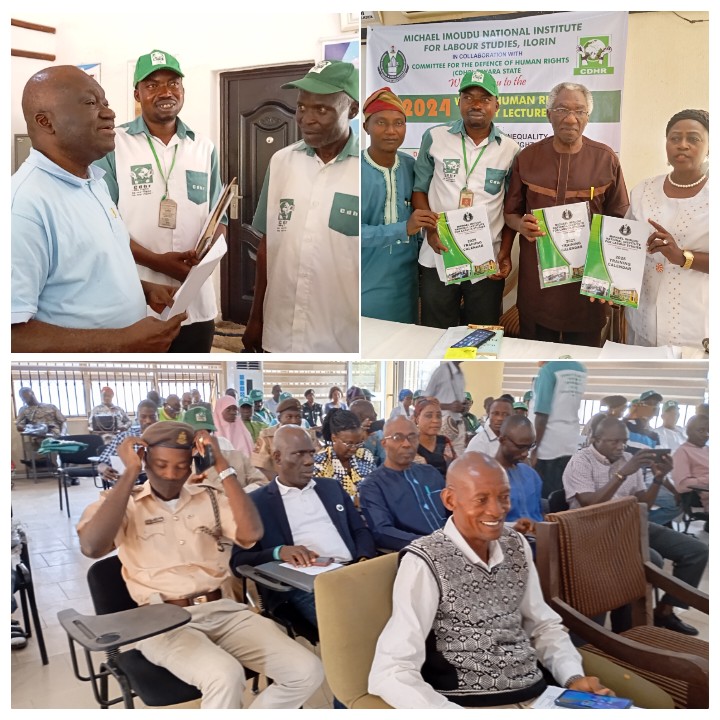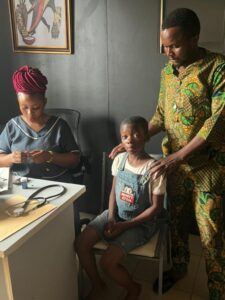
The Michael Imoudu National Institute for Labour Studies (MINILS), in collaboration with the Committee for the Defence of Human Rights (CDHR), Kwara State Chapter, commemorated the 2024 World Human Rights Day with a lecture held in Ilorin on December 10.
The event, themed “Equality: Reducing Inequalities and Advancing Human Rights,” brought together stakeholders, human rights advocates, labour leaders, and government representatives to reflect on the importance of equality and justice in Nigeria.
The gathering honored the adoption of the Universal Declaration of Human Rights (UDHR) by the United Nations General Assembly in 1948, which laid the foundation for modern human rights laws and advocacy.
The Chairperson of the Joint Planning Committee, Mrs. Olowoniyi Bukola, represented by Miss Rotimi Damilola, expressed gratitude to stakeholders for their unwavering commitment to human rights.
In her opening remarks, she emphasized the transformative impact of the UDHR: “Today, we recognize the profound influence of the UDHR on the global human rights landscape. This foundational document inspires us to strive for justice, equality, and dignity for all.”
The keynote lecture was delivered by Professor Poju Akinyanju, a distinguished academic, who delved into the historical and contemporary relevance of the UDHR.
He highlighted the document’s role in fostering dignity, liberty, equality, and brotherhood, despite ongoing global and national challenges.
Professor Akinyanju criticized the failure of nations to uphold the UN’s ideals, citing conflicts and human rights abuses worldwide, including the Israeli-Palestinian conflict, the war in Ukraine, and genocides in Rwanda and Bosnia.
However, he acknowledged the UDHR’s enduring relevance: “While the UN has fallen short in achieving its mission, the structures and guidelines laid down, particularly through the UDHR, remain pivotal in promoting justice and equity.”
He also lauded the inclusion of UDHR principles in Nigeria’s Constitution, particularly in Chapter Four, which enshrines fundamental human rights such as the right to life, dignity, personal liberty, and freedom from discrimination.
The Director General of MINILS, Comrade Issa Aremu, mni, emphasized the institute’s commitment to fostering a culture of human rights through education and advocacy.
He urged participants to draw inspiration from the institute’s namesake, Pa Michael Imoudu, a legendary labour leader who championed social justice.
Hajia Sa’adatu Modibbo Kawu, the Kwara State Commissioner for Education and Human Capital Development, represented by Mr. Gbadeyan Simeon commended the theme of the event.
In her address, she identified key strategies for reducing inequalities, such as progressive taxation, access to quality education, and promoting gender equality: “Advancing human rights requires addressing systemic barriers to equality. This includes implementing policies that empower vulnerable populations and create equitable opportunities for all.”
Representing the Nigeria Labour Congress (NLC), Comrade Elachochi Eigege Isaiah reinforced the importance of labour rights in promoting equality.
Similarly, Comrade Abdulrahman Olayinka Onikijipa, Chairman of the Trade Union Congress (TUC), called for a balanced approach to industrial actions, advocating collaboration between workers and employers to achieve fairness and workplace harmony.
In his welcome address, Comrade Lukman Olanrewaju Afolabi, Chairman of CDHR Kwara State, reiterated the organization’s commitment to defending human rights.
“Human rights are the bedrock of a just society. We must remain vigilant in holding governments and institutions accountable for upholding the rights and dignity of every individual,” he said.
Comrade Debo Adeniran, the National President Conrade of CDHR Nigeria was represented by Comrade Idris Afees Olayinka, National Publicity Secretary CDHR Nigeria who delivered the national press release on World Human Rights Day 2024 on his behalf at the event.
Nigeria Police Force (NPF) represented by Kolawole Temitope, the force reaffirmed its commitment to safeguarding citizens’ rights while ensuring security and order.
“The Police are partners in promoting human dignity and justice. We are dedicated to protecting the fundamental freedoms of all Nigerians,” he stated.
Nigeria Immigration Service (NIS), represented by R.O Imam commended the collaboration between MINILS and CDHR.
He highlighted the role of the NIS in promoting migration policies that respect human rights. “Immigration services are integral to reducing inequalities by ensuring fair treatment for all individuals, regardless of nationality,” he noted.
Representing Nigeria Labour Congress (NLC) Chairman, Comrade Elachochi Eigege Isaiah emphasized the importance of labor rights as a foundation for reducing inequality. He urged the government and employers to prioritize equitable wages and safe working conditions.
The event also provided a platform to discuss pressing human rights issues, including racial discrimination, children’s rights, women’s rights, and environmental justice.
Participants reaffirmed their commitment to upholding the values enshrined in the UDHR and tackling emerging challenges in the 21st century.
The 2024 World Human Rights Day lecture concluded with a call for collective action to advance equality and justice in Nigeria.
Through dialogue, education, and advocacy, stakeholders expressed hope for a future where human rights are universally respected and inequalities are significantly reduced.
The event reinforced the importance of partnerships between organizations like MINILS and CDHR in fostering a culture of human rights, offering a reminder of the power of collaboration in shaping a more equitable society.






